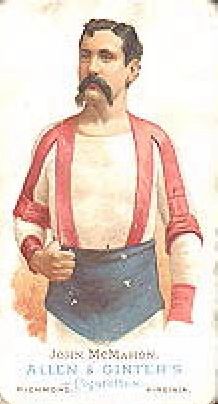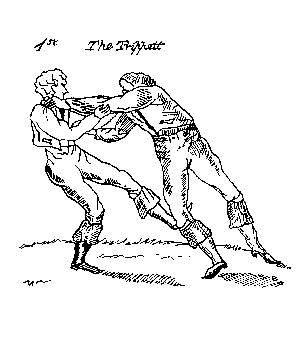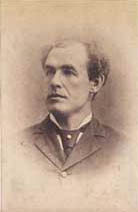John McMahon
Journal of Manly Arts
June 2002
By Mark S. Hewitt
 John McMahon is acknowledged as one of the greatest exponents of collar-and-elbow
style wrestling this world has ever seen. This archaic form of wrestling
was brought to North America by Irish immigrants and for a time was the
popular style used by the early professional wrestlers. Collar-and-elbow
is a standing style of wrestling that involves grasping one another's collar
and elbow and through various hip locks, cross buttocks, grapevines and
trips attempting to toss one another to the ground. A fall was called when
one man touched the ground with either two hips and one shoulder or both
shoulders and one hip.
John McMahon is acknowledged as one of the greatest exponents of collar-and-elbow
style wrestling this world has ever seen. This archaic form of wrestling
was brought to North America by Irish immigrants and for a time was the
popular style used by the early professional wrestlers. Collar-and-elbow
is a standing style of wrestling that involves grasping one another's collar
and elbow and through various hip locks, cross buttocks, grapevines and
trips attempting to toss one another to the ground. A fall was called when
one man touched the ground with either two hips and one shoulder or both
shoulders and one hip.
McMahon was born in Vermont in 1841 to an Irish farm family, well known
for their athletic abilities. He grew to a robust 5'10 ½ " tall
and weighed when conditioned 190 pounds. His first public wrestling match
was held at Port Henry, New York in June of 1861. McMahon faced Peter English
for $100 a side and won in eighteen minutes. Three months later, again
at Port Henry he took on and defeated Hugh Fitzpatrick. This time the bout
was held for $150 a side. Pro wrestlers of the era made their money by
betting on their matches. Occasionally a wrestler might tour with a circus
or carnival or go on the theater circuit but 19th century wrestling
was largely a side bet affair.
McMahon, called "the Green Mountain Boy" continued wrestling throughout
the United States and Canada and went undefeated until 1878. On July 22,1873
in Troy, N.Y. McMahon met Thomas Copeland of Montreal. The match was billed
for the championship of the U.S. and Canada. McMahon was strongly favored
and there was little betting despite the heavy odds being offered. Another
collar-and -elbow wrestler named Homer Lane served as the referee. Copeland
won the initial fall in six minutes, only to lose the next two in a little
less than a quarter of an hour. McMahon completely out-classed his opponent
and it was suspected that he let Copeland take the opening fall.
The following month at Harry Hill's Coliseum in New York City McMahon
was matched with Albert Ellis, "the champion wrestler of England ". The
venue was packed with fans, many having made the trek from Boston, Chicago,
Baltimore and Philadelphia. Ellis weighed in at 138 pounds, compared to
McMahon's 192 lbs. Due to the weight difference the match was held under
Devonshire and Cornwall rules, similar to collar-and elbow but requiring
the use of a jacket. Homer Lane was selected to be the referee. It was
noted that Ellis was well conditioned, while the Green Mountain Boy appeared
"soft and flabby". Though Ellis demonstrated greater agility and technical
know-how, he could not overcome McMahon's superior size and strength. McMahon
won the opening fall with a powerful cross buttock. Ellis' corner disputed
the fall and the match was nearly broken up over the ensuing controversy.
Ellis gamely consented to continue and allow his opponent the fall. The
Englishman was given the second fall on a foul. Going for the winning fall
Ellis cleverly avoided several falls, when upon being thrown by McMahon
he swiftly reversed himself before hitting the ground and landed face down.
The fans heartily cheered his displays of dexterity. McMahon finally managed
to slam Ellis flat on his back, thus winning the contest. A newspaper account
reports, " A Great deal of money changed hands on the event."
Exactly a year later, again at Harry Hill's, McMahon and Ellis met for
a rematch. Ellis had stayed in America wrestling exhibitions and working
as a stonemason.
Each man put up $500 and the match was again under the jacket rules.
It was further stipulated that choking and kicking above the knees was
barred. Harry Hill was the third man in the ring. McMahon tried over and
over again to throw the diminutive wrestler but was out-foxed by his technique.
McMahon used an inside leg lock and sent Ellis earth-bound, only to have
the Englishman turn and land on his hips. Tired and angry, the American
shouted, "If that wasn't a fall, I will leave", whereupon he jumped out
of the ring. Hill gave the wrestlers a five-minute rest and stated that
if only one man returned to the ring he would be awarded the entire stake.
McMahon composed himself and returned to the ring. Hill discussed the match
with both wrestlers and than declared the bout a draw. Yet a third match
was held, this time for $700 a side. McMahon won.
McMahon barnstormed the country, wrestling wherever a match could be
arranged. In July of 1877 in Mendecino,CA. he defeated a gigantic lumberjack
named Harry Thurston for a $500 purse. The match was conducted on the ground
at the lumber camp. One notable contest was against "Dakota Bill" in Virginia
City, Nevada. William J. "Dakota Bill" Tompkins, 6'2", 190 lbs. was known
throughout the area as both a champion wrestler and a tough rough-and-tumble
fighter. Early in January of 1878 he was playing poker at the Gold Nugget
saloon when three men entered, one standing out as tall and athletic. The
trio offered to buy a round of drinks for the house. As a crowd of thirsty
patrons gathered around a conversation was started on the subject of wrestling.
The bartender pointed out the rugged man playing cards as their local champ.
The tall stranger replied, " I'll bet $200 he can't throw me twice in a
day." The barkeep agreed to back Tompkins and the match was arranged, collar-and-elbow,
$250 a side. Miners and teamsters packed the saloon and bet heavily on
"Dakota Bill". Tompkins won the first fall in thirteen minutes. His backers
wagered more money with the "unknown's " two friends, who were ready and
willing to cover all bets. Minutes into the second round, the stranger
slammed the big westerner forcefully to the floor for a fall. They went
at it for forty-five minutes of desperate struggle until "Dakota Bill"
took another fall. The betting was brisker than ever with odds on Bill
at 3 to 1. The "unknown" jerked Tompkins off his feet and balanced him
on his hip. "Dakota Bill" tried frantically to avoid a fall, but his opponent
raised him shoulder high and smashed him head first on the ground. Now
each man had two falls, the next one would win the match as per the agreement.
The "unknown's" friends were now offering odds in favor of their man. Tompkins
tried desperately to win but was quickly dumped on his head once more.
The tall stranger was revealed to be the famous eastern wrestler John McMahon.
The story later came out that McMahon's services had been sought out by
a gambler who had recently lost a large sum at cards to Tompkins. McMahon
had been sent in as a "ringer".

The Trippett
Later in January McMahon lost his first recorded match to James Farwell,
"champion of the Pacific Coast" in San Francisco. The legitimacy of the
contest was highly suspicious and soon afterwards McMahon was shot under
mysterious circumstances. McMahon wasn't seriously wounded, recovered and
opened up a sporting house/saloon in Virginia City. For several years his
chief rival to the undisputed collar-and-elbow championship had been Colonel
J.H. McLaughlin of Detroit. McLaughlin, a 265- pound powerhouse had always
refused to meet McMahon. The Colonel announced his retirement from the
game and went to work as a conductor on the Canada Southern Railway. McMahon
followed suit and seemed content to operate his saloon. However he did
maintain that a match with McLaughlin could draw him back on the mat.
In October of 1878 McLaughlin challenged "any man in the world" to meet
his "unknown" for the collar-and-elbow championship and up to $5000 a side.
McMahon saw his opportunity to finally come to grips with Col. McLaughlin,
sold off his business and headed to Detroit. McMahon was told he must meet
McLaughlin's "Unknown". The Green Mountain Boy beat the Colonel's protégé,
whose name was Robert Wright and challenged McLaughlin. McLaughlin agreed,
providing the match took place in Detroit. McMahon refused, not wanting
to wrestle in his opponent's "backyard". McMahon insisted they square off
in New York or Chicago. The latter city was acceptable and the "two Macs"
battled on November 23, 1878 at McCormick's Hall. Large delegations traveled
from all over Michigan, New York and New England to witness the contest.
Thousands of dollars was wagered on the outcome. The wrestlers each placed
a $5000 bet. They were meeting for the right to be called the undisputed
champion of America. The contestants were described as "the modern Hector
and Achilles".
From the opening lock-up McLaughlin tried to overpower McMahon, who
resisted and thwarted all attempts to throw him. McMahon went on the attack,
forcing the burly Colonel to defend himself. The epic struggle continued.
McLaughlin hip locked McMahon to the floor but failed to score a fall.
Several near falls were gained by both men. At twenty-two minutes McLaughlin,
with the crowd at a fever pitch hip locked McMahon onto his back for the
first fall. After a brief rest, the gladiators resumed the battle. Again
both men threw one another to the ground, with no square falls being registered.
A newspaper account recorded, " The men tugged, wrestled and twisted for
a long time, then McMahon got a hip lock on McLaughlin and lifted him with
a sudden jerk off the stage and drew him up on his hip. The crowd rose
en mass to their feet and awaited the struggle with eager interest. All
of a sudden McMahon threw his opponent on his back and won the fall amid
loud cheers."
Going for the third and winning fall, both wrestlers were desperate
and near-exhaustion. The battling went back and forth until McMahon used
a grapevine lock to throw his antagonist onto his back for the victory.
This wrestling contest was one of the greatest matches of all time and
ranks with such legendary bouts as Gotch/Hackenschmidt and Stecher/Lewis.
McLaughlin stated that he had been fairly beaten in a genuine match. Claiming
to have not properly trained, he challenged for a rematch. They met one
month later under "collar-and-elbow in harness" rules and this time the
Colonel won. A third contest was held in Boston in March of 1879 and went
to a draw. Each man won one fall. The match was held by alternating falls
between the use of a jacket and a harness.

Henry Moses Dufur
McMahon continued wrestling, mostly in the east. He had several bouts
with the all-around athlete Prof. William Miller. McMahon won one match,
Miller won three and another contest at Madison Square Garden went to a
draw. Henry Moses Dufur was gaining a reputation at collar-and-elbow wrestling
and soon challenges and counter-challenges were flying between McMahon
and Dufur. They contested in Boston on March 16, 1880 and wrestled for
nearly six hours without a single fall. McMahon faced the likes of William
Muldoon, Captain James C. Daly and Gus Lambert through 1882. In December
of 1883 a second bout with Dufur was arranged in Boston. McMahon, overweight
and out of shape withdrew after two hours of wrestling. Reconditioned he
defeated Dufur the following year in a match billed for the collar-and-elbow
championship of the world. In 1886 McMahon toured with Forepaugh's Circus
giving wrestling exhibitions. As the 19th century drew to a
close, collar-and-elbow wrestling was on the wane. Graeco-Roman and Catch-as-catch-can
were increasing in popularity. McMahon had a few bouts mostly in his native
Vermont and in Massachusetts. His last recorded contest was March 2, 1891
in Montreal. He defeated Jim Cowley of Texas.
Further reading online -
www.leabharlann.org/Online-Docs/Wrestling%20in%20Gaelic%20Culture.pdf
http://www.the-exiles.org/manual/norfwres/norfwres.htm
http://ejmas.com/jwma/jwmaart_pfrenger_0300.htm
http://ejmas.com/jmanly/jmanlyart_leyshon2_0701.htm
 John McMahon is acknowledged as one of the greatest exponents of collar-and-elbow
style wrestling this world has ever seen. This archaic form of wrestling
was brought to North America by Irish immigrants and for a time was the
popular style used by the early professional wrestlers. Collar-and-elbow
is a standing style of wrestling that involves grasping one another's collar
and elbow and through various hip locks, cross buttocks, grapevines and
trips attempting to toss one another to the ground. A fall was called when
one man touched the ground with either two hips and one shoulder or both
shoulders and one hip.
John McMahon is acknowledged as one of the greatest exponents of collar-and-elbow
style wrestling this world has ever seen. This archaic form of wrestling
was brought to North America by Irish immigrants and for a time was the
popular style used by the early professional wrestlers. Collar-and-elbow
is a standing style of wrestling that involves grasping one another's collar
and elbow and through various hip locks, cross buttocks, grapevines and
trips attempting to toss one another to the ground. A fall was called when
one man touched the ground with either two hips and one shoulder or both
shoulders and one hip.
